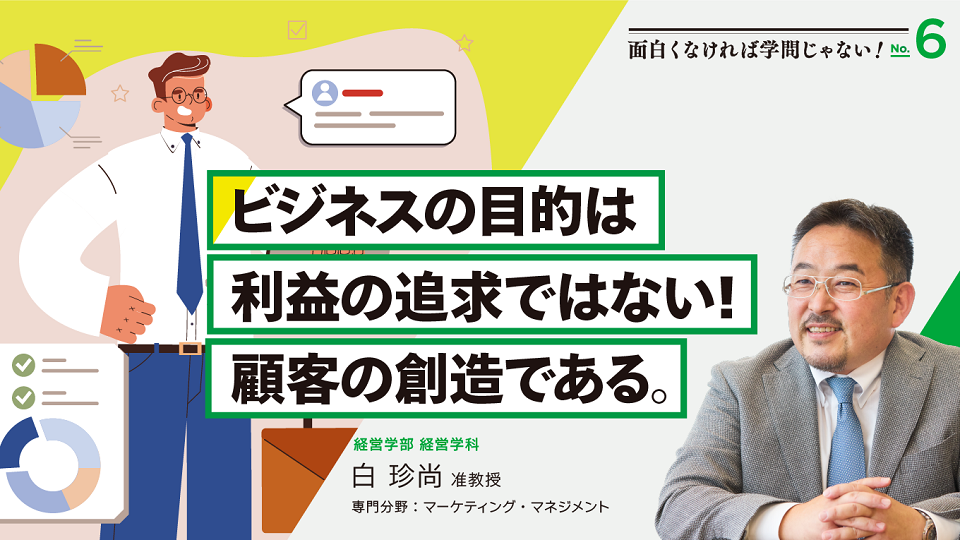
The purpose of business is not to pursue profits!
It's about creating customers.
It's about creating customers.


#Asia University research
BAIK Jin Sang Associate Professor
Faculty of Business Administration Department of Business Administration
2024.01.24
The series project "If it ain't interesting, it ain't academic!" will feature research content and episodes from Asia University faculty members. The sixth edition features Faculty of Business Administration the Department of Management BAIK Jin Sang Associate Professor.

Drucker Business Management
Since the introduction of the book ``Modern Management'' in 1954, Drucker Management has been practiced by many managers and businessmen, and research by many management scholars. Since then, there have been many Drucker booms, most recently in 2009 when the book ``What if a Female High School Baseball Manager Read Drucker's ``Management'''' (written by Natsumi Iwasaki, published by Diamond) became a bestseller. Due to the so-called "Moshi Dora" boom, the word management has become widely known not only to business managers who manage at work and male office workers who think about management, but also to people such as high school students and housewives who have never thought about management. Now you can
It is generally believed that the purpose of business is to increase profits, but Drucker's management theory is unique in that the purpose of business conducted by an organization called a company is ``creating customers.'' For example, when only one part of our body, such as the heart, becomes enlarged, our height or skeleton becomes unable to support the enlarged part, or nutrition is concentrated only in a specific organ, hindering the growth of other organs. It is determined that the disease requires treatment. Similarly, it is not only the companies that absorb an abnormally large amount of nutrients in society that grow, but by continuing to create new value and customers through the business that is developed by each organization and organ of society. Society as a whole will achieve growth and development.
In other words, the most important feature of Drucker's management philosophy is that the company as an organization that contributes to the development of society as a whole, and the business conducted by the company as an organization, should be made more efficient and effective. This is where management is essential.
Future-oriented

Of course, profits are essential for a company to survive.
Companies exist by receiving investment from an unspecified number of people in the form of stocks and other means, employ diverse and talented people with knowledge, skills, and know-how, and conduct business through their efforts. They have complex relationships with countless business partners. They have a responsibility to continue to grow sustainably by effectively utilizing the social resources entrusted to them by such stakeholders. Therefore, profits generated by past work must be used for technological research, new product development, expansion of production facilities, etc., and secured as costs for creating new businesses and products, and for creating the future.
Paradoxically, a business that is entrusted with valuable social resources by stakeholders but is unable to provide products that are valuable to customers and cannot offer products and services that consumers want will lose its reason to exist in society.
Profits can be thought of as a measure of the success of work done in the past.
To use the analogy of driving a car, we drive along a winding mountain road or a straight highway while looking at the blue sky and trees swaying in the wind through the windshield. We look at the rearview mirror to check for safety, but we cannot move forward if we only look behind us through the rearview mirror. A driver who holds the steering wheel and presses the accelerator to move the car forward must face forward and be future-oriented.
While it is necessary to look at past performance where necessary, there are many examples of scandals in which profit-driven companies have misled consumers and negatively impacted customers and society.
In other words, for companies that must continue to grow sustainably by utilizing valuable social resources, profits must be considered not so much as a goal, but rather a minimum outcome and a minimum condition for creating the future.
Companies exist by receiving investment from an unspecified number of people in the form of stocks and other means, employ diverse and talented people with knowledge, skills, and know-how, and conduct business through their efforts. They have complex relationships with countless business partners. They have a responsibility to continue to grow sustainably by effectively utilizing the social resources entrusted to them by such stakeholders. Therefore, profits generated by past work must be used for technological research, new product development, expansion of production facilities, etc., and secured as costs for creating new businesses and products, and for creating the future.
Paradoxically, a business that is entrusted with valuable social resources by stakeholders but is unable to provide products that are valuable to customers and cannot offer products and services that consumers want will lose its reason to exist in society.
Profits can be thought of as a measure of the success of work done in the past.
To use the analogy of driving a car, we drive along a winding mountain road or a straight highway while looking at the blue sky and trees swaying in the wind through the windshield. We look at the rearview mirror to check for safety, but we cannot move forward if we only look behind us through the rearview mirror. A driver who holds the steering wheel and presses the accelerator to move the car forward must face forward and be future-oriented.
While it is necessary to look at past performance where necessary, there are many examples of scandals in which profit-driven companies have misled consumers and negatively impacted customers and society.
In other words, for companies that must continue to grow sustainably by utilizing valuable social resources, profits must be considered not so much as a goal, but rather a minimum outcome and a minimum condition for creating the future.
Creating the Future
Drucker said, ``One thing we know about the future is that we cannot know the future. And the other is that the future is different from what exists now and from what we currently expect.'' It's so basic, but also so poorly understood.
The words that we cannot know the future may sound as if they would plunge us into the height of anxiety and pessimism, but these words also give us great hope. In other words, although we cannot change the past, we can change the future that has yet to come depending on which direction we are facing and what we are doing now. It suggests the necessity and possibility of creating the future with your own hands by marketing yourself and innovating yourself. It gives us hope that we can welcome ourselves.
The various environments surrounding us are constantly changing, and we are also constantly changing, and we must continue to change. Furthermore, even though people understand that they can change tomorrow by changing themselves, many do not understand the greatest risk of doing nothing.
It's easy to dream about the future and talk about it. However, a more proactive attitude is required. It requires a much more proactive attitude than deciding what to do tomorrow. It requires a much more proactive attitude than deciding what to do today to make your dreams come true, or what to do today to invite a different tomorrow. In other words, we are required to accept change as a matter of course, and to have an active attitude of creating change and creating the future ourselves.
Tomorrow does not start tomorrow, it has already begun.
It won't start if you don't start, and it won't change if you don't change.
"The future has already happened"

We don't have the special ability of fortune tellers, so we can't know the future that hasn't come yet. However, there is a future that we can know. It is the "future that has already happened" as Drucker calls it.
If one million newborns are born in 2020, barring a major war or earthquake, it is an obvious fact that the population of 20-year-olds in 2040 will be about one million. Also, by considering the average university enrollment rate and its trends, we can predict the number of university applicants in 2038. By simply calculating the male-female ratio of newborns in 2020 and the average age of marriage and its trends, we can predict the number of marriages in 2050 when they reach marriageable age, and by looking at the trends in birth rates, we can also predict the decrease in the number of newborns born to newlywed couples. Even if we cannot predict exact numbers, we can know that the trend toward a decline in population and fewer applicants to universities, intensifying competition between universities, and the transformation into more attractive universities are inevitable facts.
It is necessary to study history and the past, see what changes have occurred and how they are affecting the present, look at the changes currently occurring and see how they will affect the future, discover the lines and trends that connect the dots, and take advantage of the time lag until the changes and their effects are realized in reality to make preparations and take measures. There is a time lag of 18 years until 2038, when a newborn baby born in 2020 will be an 18-year-old exam candidate, and a time lag of 30 years until 2050, when the baby will be 30 years old and of marriageable age.
A declining population is seen as a social problem, such as a shrinking economy and labor shortages, but during the time lag before the future that has already happened becomes a concrete reality, social problems and the resulting changes and impacts can be transformed into future opportunities, depending on what preparations and measures are taken. While population decline due to a low birth rate is considered a serious problem, society's interest in each child and the affection of families are deeper than ever, and the educational expenses spent by parents and grandparents on each child will be greater than ever. If we look at this, it is possible to create new value even as the market size of the education business shrinks.
In short, the ability to create future opportunities by utilizing the time lag between what has already occurred and the future is what defines management skill, and the ability of top management.
If one million newborns are born in 2020, barring a major war or earthquake, it is an obvious fact that the population of 20-year-olds in 2040 will be about one million. Also, by considering the average university enrollment rate and its trends, we can predict the number of university applicants in 2038. By simply calculating the male-female ratio of newborns in 2020 and the average age of marriage and its trends, we can predict the number of marriages in 2050 when they reach marriageable age, and by looking at the trends in birth rates, we can also predict the decrease in the number of newborns born to newlywed couples. Even if we cannot predict exact numbers, we can know that the trend toward a decline in population and fewer applicants to universities, intensifying competition between universities, and the transformation into more attractive universities are inevitable facts.
It is necessary to study history and the past, see what changes have occurred and how they are affecting the present, look at the changes currently occurring and see how they will affect the future, discover the lines and trends that connect the dots, and take advantage of the time lag until the changes and their effects are realized in reality to make preparations and take measures. There is a time lag of 18 years until 2038, when a newborn baby born in 2020 will be an 18-year-old exam candidate, and a time lag of 30 years until 2050, when the baby will be 30 years old and of marriageable age.
A declining population is seen as a social problem, such as a shrinking economy and labor shortages, but during the time lag before the future that has already happened becomes a concrete reality, social problems and the resulting changes and impacts can be transformed into future opportunities, depending on what preparations and measures are taken. While population decline due to a low birth rate is considered a serious problem, society's interest in each child and the affection of families are deeper than ever, and the educational expenses spent by parents and grandparents on each child will be greater than ever. If we look at this, it is possible to create new value even as the market size of the education business shrinks.
In short, the ability to create future opportunities by utilizing the time lag between what has already occurred and the future is what defines management skill, and the ability of top management.
Self-management

It is extremely difficult to teach someone who has never been in the ocean or a pool how to swim using only words.
Similarly, teaching management through classroom Lecture alone to students who have never belonged to an organization, been managed, or had any management experience is extremely difficult, and this is a problem I struggle with every day in the classroom.
I think that an effective method of management education is to have students repeat successful experiences of achieving results through management. I believe that grasping the "future that has already happened" of job hunting two to three years from now, and then repeating the successful experiences of achieving concrete results through self-management, which involves setting one's own goals and making efforts while managing limited time and energy, during the time lag of student life, will lead to students growing into future business leaders who contribute to the development of society and the economy.
I always strongly encourage my students to take up the challenge of taking qualification exams. Although they are not difficult, each student can set a date for their dreams and goals, manage themselves by allocating their limited resources of 24 hours a day to classes, club activities, part-time jobs, etc., and obtain a qualification, which not only gives them the experience of success, but also allows them to feel that they are gradually growing into the ideal version of themselves and the type of person that companies want.
As a result, all fourth-year students in the seminar have acquired more than 10 qualifications in the short period of about one and a half years, including Microsoft Office Expert (Advanced) certification, Secretary Skills Certification Level 2, Retail Marketing (Salesperson) Level 2, Marketing and Business Proficiency Certification Level B, Foreign Trade Proficiency Certification Level B, IT Passport, Type 1 Securities Salesperson, and Internal Control Officer, and have received job offers from multiple companies.
Rather than the mere fact that they have acquired each of these qualifications, what is being highly evaluated is the process by which each student sets and challenges themselves to achieve their goals, works hard to achieve them, markets themselves, innovates themselves, and manages themselves to continue to achieve results.
Similarly, teaching management through classroom Lecture alone to students who have never belonged to an organization, been managed, or had any management experience is extremely difficult, and this is a problem I struggle with every day in the classroom.
I think that an effective method of management education is to have students repeat successful experiences of achieving results through management. I believe that grasping the "future that has already happened" of job hunting two to three years from now, and then repeating the successful experiences of achieving concrete results through self-management, which involves setting one's own goals and making efforts while managing limited time and energy, during the time lag of student life, will lead to students growing into future business leaders who contribute to the development of society and the economy.
I always strongly encourage my students to take up the challenge of taking qualification exams. Although they are not difficult, each student can set a date for their dreams and goals, manage themselves by allocating their limited resources of 24 hours a day to classes, club activities, part-time jobs, etc., and obtain a qualification, which not only gives them the experience of success, but also allows them to feel that they are gradually growing into the ideal version of themselves and the type of person that companies want.
As a result, all fourth-year students in the seminar have acquired more than 10 qualifications in the short period of about one and a half years, including Microsoft Office Expert (Advanced) certification, Secretary Skills Certification Level 2, Retail Marketing (Salesperson) Level 2, Marketing and Business Proficiency Certification Level B, Foreign Trade Proficiency Certification Level B, IT Passport, Type 1 Securities Salesperson, and Internal Control Officer, and have received job offers from multiple companies.
Rather than the mere fact that they have acquired each of these qualifications, what is being highly evaluated is the process by which each student sets and challenges themselves to achieve their goals, works hard to achieve them, markets themselves, innovates themselves, and manages themselves to continue to achieve results.
Integrity (honest character, sincerity, sincerity)
One of the tasks that current managers must perform is to train the next managers, successors, and future managers. Even talented and talented managers such as Steve Jobs cannot remain in the role of manager forever, but organizations such as companies that are entrusted with social resources must continue to exist, so it is essential for current managers to train future managers.
Drucker lists "integrity" (noble character, sincerity, honesty) as a management quality (leadership quality) that should be emphasized when selecting future executives and managers who will be in charge of managing the future.
Integrity cannot be evaluated by education level or test results. It also cannot be evaluated by sales or profits. There are many highly educated personnel with specialized knowledge and skills, and many personnel with abundant experience and excellent results. It is possible to give them even more advanced education and even more abundant experience, but the integrity that exudes from a person's work, decisions, and actions is not something that can be easily acquired through short education or training.
A challenging spirit, autonomy, initiative, management ability, and management qualities are skills, habits, attitudes, and behaviors that can be acquired through everyday actions. By cherishing each and every day, interacting with a variety of people, being moved by a variety of events, and repeatedly acting the right way, we acquire integrity (noble character, sincerity, honesty).
Making decisions such as misrepresenting the origin of a product for the sake of sales and profits, despite knowing that it will have a negative impact on consumers and society, is not due to a lack of knowledge, skills, or experience. It is a problem with the character of the managers who decided to sell the product despite knowing that it was wrong, and the quality of management who gave up on correcting the situation despite knowing that it was wrong.
Related Links
- Faculty of Business Administration TOP
- Faculty Faculty of Business Administration Faculty Introduction
- Faculty of Business Administration Department of Business Administration Department Introduction
- Faculty Faculty of Business Administration of Business Administration 4 years of study
- Faculty of Business Administration of Business Administration Course Model
- Faculty of Business Administration of Business Administration Classes/Special Lecture
- Faculty of Business Administration of Business Administration Seminar
- Faculty of Business Administration Department of Business Administration Faculty